PM Carney announces a departure from the traditional economic alliance with the US, urging a transformation of Canada's economy in light of recent tariffs.
Canada PM Mark Carney Declares End of Traditional US Partnership

Canada PM Mark Carney Declares End of Traditional US Partnership
Canada's Prime Minister Marks a Shift in Economic Strategy Amid Tariff Disputes
Canadian Prime Minister Mark Carney has officially stated that the historical relationship between Canada and the United States, characterized by economic integration and military cooperation, has come to an end. Addressing reporters in Ottawa following a cabinet meeting, Carney emphasized the need for Canadians to "fundamentally reimagine our economy" in the wake of US President Donald Trump's newly imposed tariffs. Carney announced that retaliatory measures would be introduced, aiming for "maximum impact" on the US.
Trump's recent declaration of a 25% tax on imported vehicles and parts, labeled as "permanent," spurred Carney's remarks. He referred to the 1965 Canada-US Automotive Products Agreement as a cornerstone of trade relations, now rendered obsolete by these tariffs. He reassured Canadians that with collective effort from government and industry, a sustainable auto sector could be developed, even under the pressure of US tariffs.
The US has already inflicted a blanket 25% tariff on various Canadian goods, coupled with similar duties on aluminum and steel imports. In response, Canada has enacted approximately CAD$60 billion (USD$42 billion) in tariffs on American products. The auto tariffs are scheduled to commence on April 2, with additional charges on vehicle parts being implemented in May.
Tensions escalated with Trump's warning aimed at Canada and the European Union about collaborating against US interests, threatening larger tariffs if they unite to inflict economic damage. Carney convened his ministers to navigate these trade challenges, as a call from President Trump was anticipated in the coming days, marking a potential first direct conversation between the two leaders.
The opposition, represented by Conservative leader Pierre Poilievre, criticized the tariffs as "unprovoked," while NDP leader Jagmeet Singh labeled them a "betrayal" from a crucial ally. Singh expressed intentions to protect Canadian jobs and industries surrounding Windsor, Ontario, a known auto manufacturing hub.
Canada's upcoming election is set for April 28, as the ramifications of US tariffs on the automotive sector loom large. Meanwhile, Mexican President Claudia Sheinbaum voiced that her government would defend Mexican interests against US tariffs, promising a comprehensive response shortly after the tariffs take effect.
Amid these developments, the market dynamics are shifting, with Canada poised to reassess its place in North American trade relations, signaling substantial changes ahead for both economies.





















